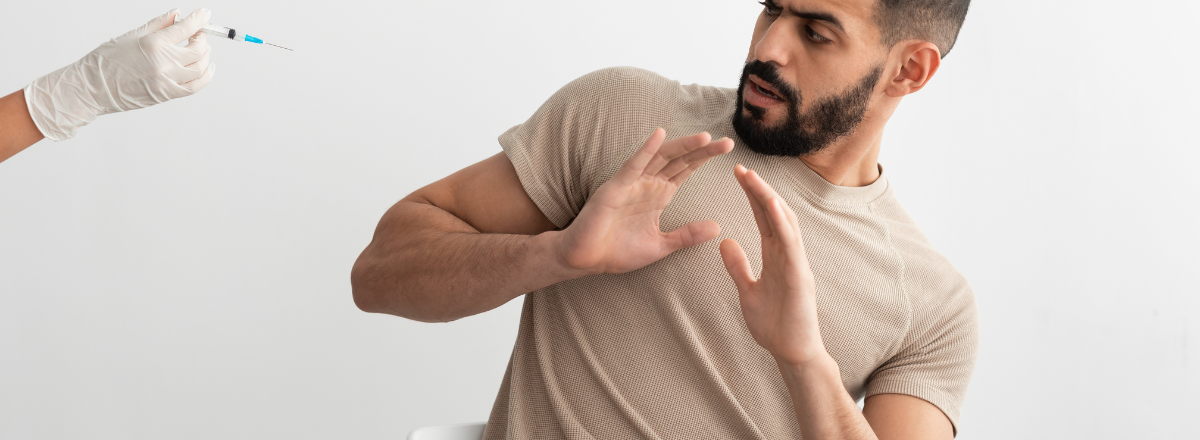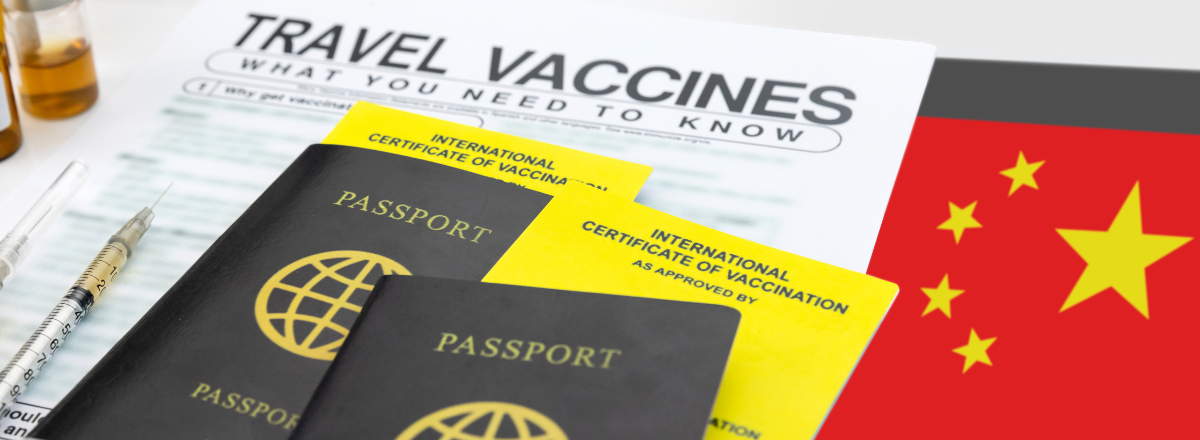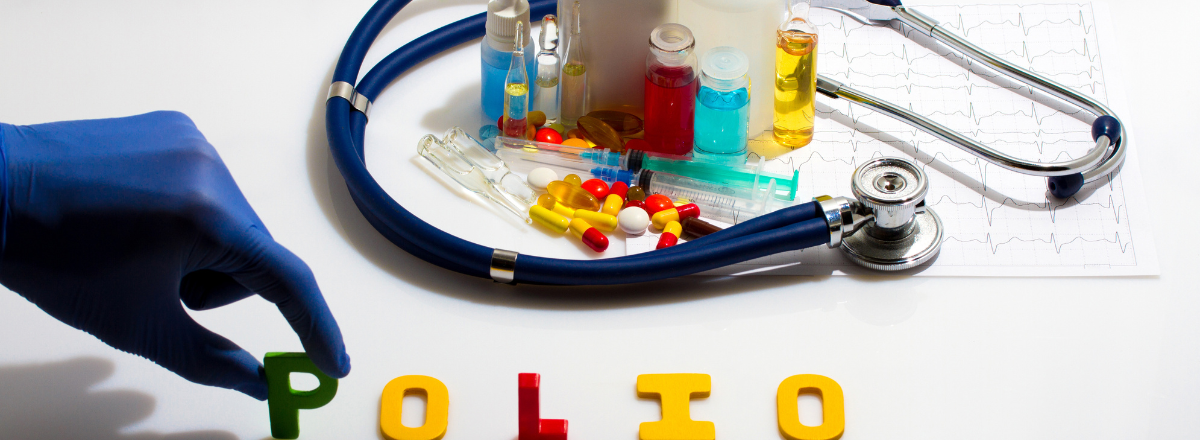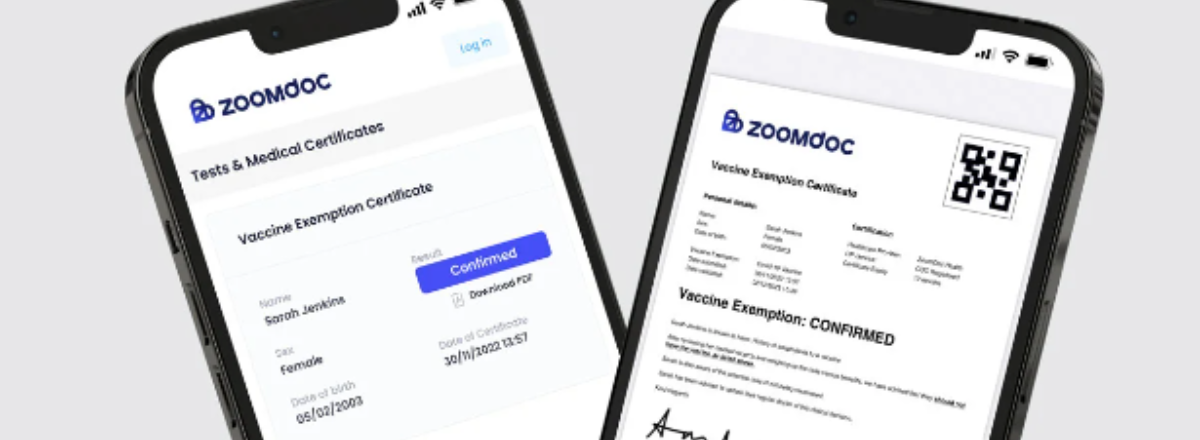By now we all know how important vaccines are for reducing the spread of disease – and even eradicating certain illnesses completely. But for some, getting jabbed simply isn’t an option. Whether it’s due to illness, allergies or another health condition, being vaccine exempt doesn’t just leave you more vulnerable to infectious diseases, it can also prevent you getting jobs in health or social care, or being able to travel if you don’t have the required proof.
That’s where ZoomDoc can help, as Chief Medical Officer and GP, Dr Kenny Livingstone explains:
‘Having a medical condition that leaves you unable to take up a vaccine and be protected from a disease can be worrying enough without the added stress of arranging proof of exemption when requested. To help, we’ve now added a Vaccine Exemption Certificate to our Medical Letters Service, which is quick and easy to use and is even available same-day.’
Here’s everything you need to know about vaccine exemption, including how to get a same-day certificate, without having to see your GP.
What does being vaccine exempt mean?

There are a number of grounds for requesting an exemption: for example, people with medical contra-indications to the vaccines.
Firstly this has nothing to do with having anti-vaccine beliefs or being scared of needles. Being vaccine exempt means you have a valid, diagnosed or recognised medical reason for not getting a specific vaccine or vaccines.
Someone who is vaccine exempt most likely has:
- an allergic reaction to other vaccines
- a history of anaphylaxis to a vaccine
- a known allergy to vaccine components (for example, egg or other ingredients)
- a multisystem inflammatory syndrome
- current moderate or severe illness
- myocarditis or pericarditis after a Covid-19 vaccine
- severe learning disabilities or severe autism for which a vaccine would cause severe distress
- terminal illness.
Other reasons for vaccine exemption
You may also have another reason for not having or wanting to take up a vaccine. These may include:
- Age-based exemption
Some age groups may be medically exempt from having a vaccine. For instance, certain vaccines, such as yellow fever, are not recommended for those under 6 months old or over 60 years old.
- Religious exemption
It’s rare to need religious exemption for a vaccine. However, some vaccines use porcine gelatine (from pigs) in their ingredients, which may be problematic for religious Jews or Muslims. There is sometimes an alternative to the vaccine so do ask your GP before arranging an exemption certificate.
- Natural immunity
Again it is rare to cite natural immunity to an illness as a reason for not having or needing a vaccine. Most of us get chickenpox naturally and therefore have sufficient antibodies meaning we don’t need the vaccine. Another rare but possible example is if you’ve had and have recovered from yellow fever, you will have lifelong natural immunity and therefore won’t need a repeat vaccine for travel purposes. (More on this below).
Travel-related vaccine exemptions

If a GP advises that an individual should not be vaccinated on medical grounds, a medical letter of exemption (MLOE) should be provided for entry to countries where a certificate is required.
Until fairly recently anyone travelling abroad needed to show proof of COVID vaccines on arrival. If you weren’t able to be vaccinated you’d have needed to show proof of exemption.
COVID travel restrictions have now ended thankfully. However, some countries still require proof of vaccinations for diseases like yellow fever, typhoid and polio, in order to enter the country – although it can depend where you’ve flown in from.
If you need a vaccination certificate for the country you’re visiting but are not able to have the vaccine due to a medical condition or due to age, the NHS says to contact or visit a travel vaccination centre.
They may recommend you take an exemption letter, which may be accepted by officials in countries that usually require a vaccination certificate.
Yellow fever exemption
You will require a yellow fever vaccine exemption certificate if you can’t have the vaccine and need to travel to a country that requires proof of vaccination.
The criteria for being yellow fever exempt are:
- age – it is not recommended for babies under 6 months old or adults over 60 [passport is sufficient evidence]
- a weakened immune system, such as those with leukaemia or lymphoma
- an immune system is weakened by treatment, such as steroids and chemotherapy
- people who are allergic to any of the ingredients in the vaccine, including people with an egg allergy
- a severe reaction to a previous dose of yellow fever vaccine
- people with a thymus gland disorder or who’ve had their thymus gland removed
- people who have a close relative who has had a severe reaction to the vaccine causing damage to the brain or other organs.
Polio, cholera, typhoid and other vaccine exemptions

Certain vaccinations are provided by the NHS at no cost to a patient – Polio, hepatitis A, typhoid, cholera.
Travel vaccines such as polio, cholera, hep A, hep B and typhoid are also often required for protection in countries such as Africa, India and South America. You may require exemption proof if you cannot have them for the following reasons:
- an allergic reaction after a previous dose of the same vaccine
- any severe, life-threatening allergies.
Talk to your GP or travel clinic about the risks of having or not having travel jabs and of course, speak to any ZoomDoc GP via our app, before ordering your exemption certificate.
Work-related vaccine exemptions

Common occupational vaccinations include: BCG. Hepatitis B. Influenza. Measles, Mumps and Rubella (MMR)
You may also need to provide proof of vaccination status, or reasons for exemption, if you work in healthcare settings, such as the NHS, or organisations registered with the Care Quality Commission (CQC).
How to get a vaccine exemption certificate

Our doctors can provide you with a same-day medical certificate that will confirm which vaccine you are advised against being given, due to associated health risks
If you are unable to have a specific vaccine for medical reasons, you may require an exemption certificate as evidence.Thanks to ZoomDoc it couldn’t be easier to get yours.
‘Our doctors can provide you with a same-day medical certificate that will confirm which vaccine you are advised against being given, due to associated health risks. No appointment is needed – simply apply online here,’ says Dr Kenny.
Once you’ve purchased yours, you’ll complete an online form requiring you to upload a short video giving your medical reasons for needing this certificate, as well as either your digital Summary Care Record or a doctor’s letter confirming the relevant medical condition.
‘Once ZoomDoc GPs have reviewed your evidence we’ll either call for more information or issue you with a verifiable digital PDF letter signed by a medical professional and sent directly to your mobile,’ says Dr Kenny.
It will contain the following details:
- your name and date of birth
- name of the specific vaccine with medical confirmation you should avoid it
- signature and authorisation by one of our GMC-registered UK doctors
- contact details of ZoomDoc Health with a QR code enabling a verification check.
Of course, if you are fit and well, make sure you are up to date with your vaccines, starting with this autumn’s COVID and flu jab roll-out which has already begun.
Travelling abroad?
Find out more ways ZoomDoc can help your holiday go smoother.
